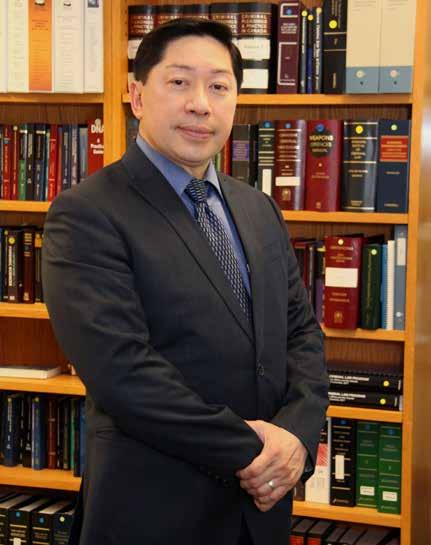
3 minute read
THE MENTAL HEALTH CHAMPION
Since graduating from KPU with a bachelor of arts in psychology in 2019, Gurjot (Joey) Chhina has been using the tools he gained through his education to make a positive impact in his community.
As a volunteer for local organizations, Chhina is committed to helping people who are facing barriers and adversity. Through the Abbotsford Restorative Justice and Advocacy Association, he mentored high-risk youth going through a police-based restorative process or the restorative action process in Abbotsford schools.
The program aims to match young people with a responsible, caring adult to receive support and encouragement. This can increase the likelihood the young person will complete the agreement successfully and will not re-offend.
Chhina also lends his time and expertise as a support worker for the Fraser Health Crisis Line, a role that involves supervising volunteers to manage crisis intervention situations.
On top of his volunteer work, Chhina is currently completing a doctorate in clinical psychology at Adler University and doing a practicum at Matsqui Institution in Abbotsford, a federal medium-security men’s prison. Working with at-risk populations is exactly what drew him into psychology in the first place, he says.
“I went into the program at KPU, and I went into my graduate school program, being passionate about wanting to help people and wanting to create something that was bigger than myself,” he explains.
The son of immigrants whose parents made significant sacrifices to put him and his sister through university, Chhina sees his education as an avenue to give back to his community. As a person of South Asian origin, he says that barriers to mental health treatment in his community inspired him to enter the field of psychology.
Research has shown higher rates of anxiety and mood disorders for this population compared to immigrants from other parts of the world, primarily due to cultural and socio-economic factors.

Canadians of South Asian origin also have the highest perceived barriers to mental health treatment and are 85 per cent less likely to seek treatment for mental illness than those who identify as white. Chhina hopes to make a difference.
“As a person of South Asian origin, mental health isn't something that's regularly talked about, unfortunately,” he says. “There's a lot of stigma –especially for males. Having the opportunity to help people in my own community – and people outside of my community – through clinical psychology is something that I’m passionate about and look forward to doing.”
Chhina says he chose KPU because of its deep roots in the community and academic rigor, which mirrored his passion for engagement and helped pique his interest in research.
“KPU is academia is given the utmost importance, but the community outreach – the connection with the Indigenous community, the connection with the entire community – is also boundless,” he says. “KPU was just one of those places where they're almost a jack of all trades.” psychology. And Dr. Bernstein encouraged his interest in research as director of the Lifespan Cognition Lab at KPU, where Chhina was a research assistant.
“They taught me a lot about being passionate about what you're pursuing, holding yourself accountable during periods of success and periods of setbacks and realizing that no matter how skilled you are, there's always more work to be done,” he says. “I contribute a significant chunk of my success to my two mentors.”
Since graduating with honours, Chhina has stayed involved with the psychology community at KPU. As a former volunteer coordinator and treasurer for the Kwantlen Psychology Society, he organized society funds toward conferences and activities that promote the field. As a former editor of the Kwantlen Psychology Student Journal, he provided guidance to students that were looking to publish their research, and he has presented at various research conferences such as the Northwest Memory and Cognition Conference (NOWCAM), Connecting Minds and the KPU Research Symposium. He credits the KPU community with helping him gain the confidence to continue with graduate studies.
“I think being able to be recognized at KPU was the biggest benefit because it really helped me gain confidence to pursue my academics and my life as intensely as I could and really allowed me to sink my teeth into my passions.”
Now, as he prepares to launch his career as a clinical psychologist, Chhina says his parents remain his biggest source of inspiration, and he considers his education his greatest achievement.
There, he found two mentors who helped guide his journey: Dr. Daniel Bernstein and Dr. Evan Lopes. Chhina says that Dr. Lopes, who received the Governor General’s Exemplary Service Medal for his work in federal correctional institutions, inspired him to explore the field of forensic correctional
“Just being in the position that I'm in right now, I think is a blessing, but it's also an achievement in itself,” he says. “Being a child of immigrants and being able to succeed at university, even at the undergraduate level, isn't an easy feat.”






